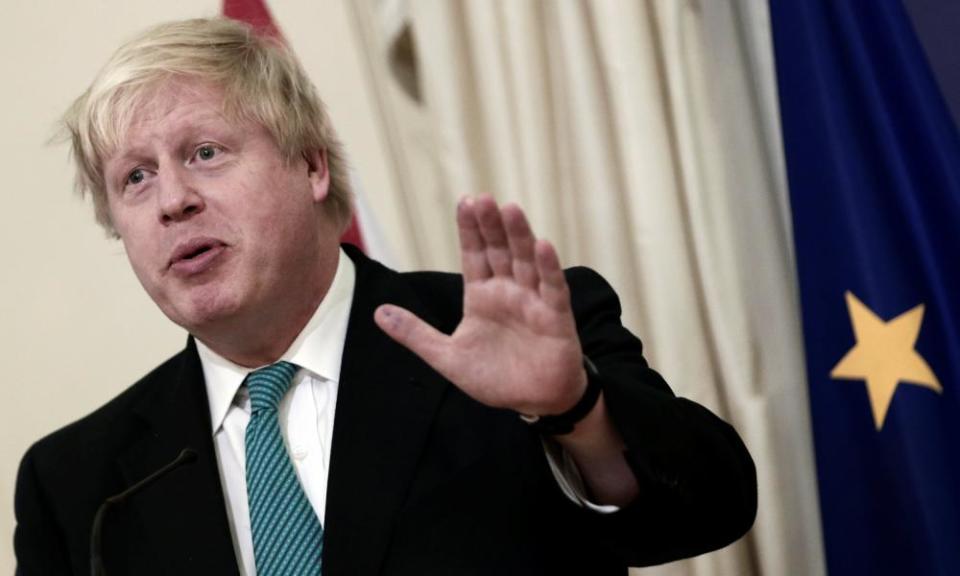Boris Johnson asks G7 to consider fresh sanctions against Russia and Syria

Vladimir Putin is “toxifying the image of Russia” by backing Bashar al-Assad and the G7 must consider fresh sanctions against Russia and Syria in response to last week’s chemical attack on civilians, Boris Johnson has said.
As Downing Street revealed that Theresa May and Donald Trump agreed a “window of opportunity” existed to put on pressure on Russia to abandon Assad, the foreign secretary stepped up the pressure on the Russian president amid evidence that the Syria had used chemical weapons.
“I think the Russians need a way out and a way forward,” Johnson told the BBC in Italy ahead of the G7 talks in the Tuscan city of Lucca. “If you think about the position of Vladimir Putin now, he’s toxifying the reputation of Russia by his continuing association with a government which has flagrantly poisoned its own people”.
He called on Moscow to do “everything possible to bring about a political settlement in Syria and work with the rest of the international community to ensure that the shocking events of the last week are never repeated”.
Johnson hopes to persuade the G7 to back proposals for new financial sanctions, including measures targeted at key military commanders from Russia and Syria.
Britain and the US believe the G7 should offer Russia a choice of continuing to back Assad and facing fresh penalties or working more closely with the west to combat the threat of Islamic militant groups across the Middle East and to rebuild Syria.
Theresa May spoke with Donald Trump on Monday night to discuss the Syrian regime’s chemical attack and the US response.
A Downing Street spokesperson said: “The prime minister and the president agreed that a window of opportunity now exists in which to persuade Russia that its alliance with Assad is no longer in its strategic interest.
“They agreed that US secretary of state Tillerson’s visit to Moscow this week provides an opportunity to make progress towards a solution which will deliver a lasting political settlement.”
The French foreign minister, Jean-Marc Ayrault, made the same linkage on the sidelines of the summit, saying “the fight against terrorism cannot be effective if we do not link it to resolving the Syrian situation”.
Johnson held talks with Rex Tillerson, the US secretary of state, before joining the other G7 foreign ministers for the summit. The foreign secretary’s allies said last week’s attack had helped shift opinion in Washington towards the necessity of regime change in Syria if a diplomatic solution to the long-running conflict was to be found.
Russia's backing for #Assad main focus of talks just now w/ US Sec of State Rex #Tillerson ahead of mtg w/ #G7 counterparts in Lucca, Italy pic.twitter.com/Fhh0D0YpkC
— Boris Johnson (@BorisJohnson) April 10, 2017
Donald Trump ordered a missile strike on Syrian airbases last week after seeing footage of the chemical weapons attack, despite repeatedly expressing wariness about intervening in the Middle East during his presidential campaign. But Tillerson subsequently appeared to suggest that defeating the Islamic State – not removing Assad – was Washington’s top priority.
Johnson has been criticised for cancelling a planned visit to Moscow on Monday in the wake of the devastating Syrian attack on the town of Khan Sheikhun after saying last week’s events had “changed the situation fundamentally”.
The Labour leader, Jeremy Corbyn, said on Monday that the foreign secretary was displaying a “cold war mentality”, by withdrawing from the trip, rather than continuing to pursue dialogue with Moscow. He warned that Johnson’s backing for the American missile strike risked sparking something “utterly disastrous”.
But johnson believes last week’s retaliatory action by the US could open the door to a fresh diplomatic effort to remove Assad from power.
Tillerson will travel to Moscow on Tuesday to deliver the G7’s message to the Russian foreign secretary, Sergei Lavrov. Russia reacted furiously to the US intervention in the conflict and has questioned the account of the chemical weapons attack given by the US and other western countries.

